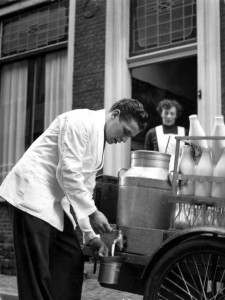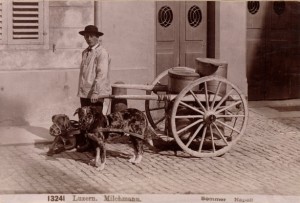Perhaps no figure in nineteenth-century New York was quite so feared as the milkman, an agent of death and destruction who delivered calamity along with his white gold, as the following articles from the Brooklyn Daily Eagle demonstrate.
••••••••••
“A Milkman Shot By a Farmer” (September 29, 1893): “Buffalo, New York–Charles Emerson, a milk peddler of this city, was shot and killed yesterday afternoon midway between here and Tonawanda by William H. Griffith, a farmer. Griffith had sold Emerson some hay and the latter was hauling it away without paying for it as agreed upon. Yesterday while Griffith was absent Emerson attempted to take away another load. Griffith returned before the wagon was loaded and a quarrel ensued during which Griffith got his gun and shot Emerson in the thigh, making an ugly wound from which he had bled to death. Griffith was arrested. He claims that Emerson was advancing on him with a pitchfork when he fired in self defense.”
••••••••••
“Found Dead in His Cell” (September 2, 1896): “Jamaica, Long Island–Patrick Quinn, a milkman of Madison Street, this village, 26 years of age, who was arrested at 6 o’clock last evening and confined in the lock up at the town hall on a charge of breaking in the windows of the house in which he lived, belonging to Annie Olrogge, was found dead in his cell this morning by Keeper Hogan. Coroner S.H. Nutt viewed the remains and will hold an inquest Friday at 7:30 P.M. Quinn had been drinking heavily of late and it is supposed that his death resulted from alcoholism.”
••••••••••

"John Diedesch, a milkman, on Saturday night called upon a customer named Augusta Buckel to collect a bill due for lacteal served during the week."
“A Demonstrative Milkman” (February 25, 1878): “John Diedesch, a milkman, on Saturday night called upon a customer named Augusta Buckel, at her residence, No. 59 Hoyt Street, to collect a bill due for lacteal served during the week. Mrs. Buckel was not prepared to liquidate the account, as her husband had not returned home, nor was Diedesch in a humor to accept any such excuse as that offered. Accordingly he gave the woman to understand that he believed she intended to cheat him, and in return Mrs. Buckel had something to say which did not tickle the milkman’s fancy. The result was that Diedesch became exceedingly angry, and in this mood struck and kicked Mrs. Buckel to that extent that she may suffer permanently from the injuries inflicted.”
••••••••••
“Drunk Carbolic Acid” (April 8, 1895): “Henry A. Nichol, a milkman, who lived at 1,155 Broadway, was found dead yesterday afternoon in a coach in the rear of the livery stable of Walter R. Thomas, at 661 Lexington Avenue, where he stabled his horse and wagon. Two vials half filled with carbolic acid and a small glass which lay beside the dead man indicated that he had committed suicide. Nichols, who was 29 years old and unmarried, had been drinking heavily for three or four weeks past, and because of his dissipated habits had lost much of his trade. His friends say he had threatened to take his life.”
••••••••••
“The Deadly Broken Wire” (December 27, 1891): “Orange, New York–Frank E. Williams, a milkman was killed by an electric shock on High Street at 3:30 o’clock this morning. An old unused wire of the District messenger service broke during the night and fell across the wires of the city lighting system, which carry a current of 2,000 volts. The weather this morning was very foggy. While Williams was delivering milk the horse went ahead, and, coming in contact with the old wire, was knocked down. Williams went to his assistance and was struck in the face by the wire, which he grasped with both hands and held on to. No person witnessed the actual occurrence. Williams was taken to the residence of J.N. Robins and Dr. Bradshaw was called in. He came too late, however, for Williams was beyond human aid. His body was taken to the morgue.
Williams was 27 years of age, and was an estimable man. He was married three months ago to Miss Moger of Roseland, where he lived. When the news of his death was broken to his young wife she was greatly overcome.”

